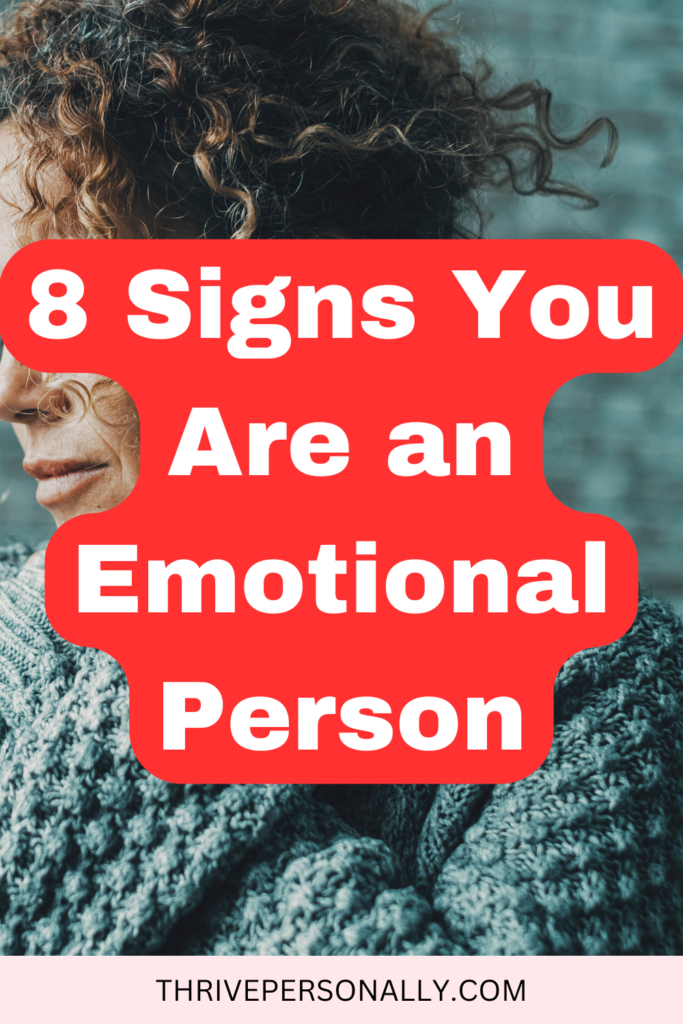Emotions play a crucial role in our lives, influencing our thoughts, actions, and relationships. Being an emotional person means that you experience feelings deeply and, at times, they may guide your decisions. Emotions reflect your inner world and how you perceive everything around you. Recognizing whether you are an emotional person can help you understand your responses to various situations, ultimately leading to better emotional management.
Understanding your emotions is vital for several reasons. Firstly, it allows you to navigate daily life more thoughtfully. When you recognize your feelings, you can make choices that align with your true self rather than reacting impulsively. For example, if you feel overwhelmed, acknowledging this emotion can prompt you to take a step back, reflect, and potentially communicate your needs to others. This practice enhances your relationships by fostering honesty and respect.
8 Signs You Are an Emotional Person
1. You Often Cry

Crying is a natural response that can occur for many reasons, including joy, sadness, or frustration. You may find that you often tear up during emotional moments, whether it’s watching a touching movie, celebrating a special occasion, or experiencing a significant loss. This reaction is a part of being human and may indicate that you are more emotionally aware and sensitive than some people.
Biologically, crying can be understood as a response to complex emotional triggers. Your body releases tears as a way to process stress and other powerful emotions. Interestingly, there are different types of tears, such as basal, reflex, and emotional tears. Emotional tears are produced in response to feelings, making them different from, for example, tears that come from chopping onions. This can show that crying is not only a physical response but also an emotional release. When you cry, it can help to alleviate feelings of tension or sadness, allowing for a period of catharsis.
Moreover, you might notice patterns in your crying habits. Perhaps you tend to cry more when you are overwhelmed or during times of change. This can be especially true if you are experiencing a significant life event, such as moving to a new city or starting a new job. Understanding your crying patterns can provide insight into your emotional landscape. It can help you recognize what triggers intense feelings so that you can better process those emotions. Remember, crying is not a sign of weakness, but rather a healthy way to express what you feel.
Read Also: 8 Signs You Are Soft-Hearted
2. You Feel Empathy for Others
Empathy is an essential human characteristic that allows you to understand and share in the feelings of others. When you are empathetic, you can connect with people on a deeper level, sensing what they are experiencing emotionally. This ability enables you to relate to their joys, sorrows, and struggles, fostering meaningful relationships.
For instance, when a friend shares their challenges, your instinct may be to listen attentively and validate their feelings, saying things like, “I can only imagine how difficult that must be for you.” This type of response not only shows that you care, but it also reassures the other person that they are not alone in their feelings. The way you respond can lighten their burden, allowing them to feel supported and understood.
Your emotional intuition also extends to recognizing when someone is in distress, even if they haven’t verbally expressed it. You may notice their body language or tone of voice and feel compelled to check on them. By doing so, you demonstrate that you are aware of their emotional state, often prompting them to open up about what is bothering them. Such interactions enhance your bond with others and create a safe space for sharing feelings.
Read Also: How to Become a Unique Person – 8 Tips
3. You Get Easily Affected by Movies or Music
Have you ever found yourself tearing up during a movie scene or feeling a lump in your throat while listening to a powerful song? If so, you might be more emotionally sensitive than you realize. When you get easily affected by movies, music, or other forms of art, it can indicate a deep connection to emotions and experiences portrayed in these mediums. This sensitivity is not simply a weakness; instead, it shows your ability to empathize deeply with others, whether they are real people or fictional characters.
When a film evokes strong feelings within you, it suggests that you relate to the characters’ struggles and joys. You might find that you see parts of yourself in their stories, making their journeys resonate on a personal level. Similarly, music can strike a chord with you, stirring memories or feelings that are unique to your experiences. The ability to feel intensely while watching a movie or listening to a song can be a testament to your emotional depth, allowing you to engage with art in a way that many might not.
This emotional connection can serve as a source of strength. It fosters a greater understanding of your own feelings while enhancing your creativity and expression. Artists, writers, and musicians often tap into their emotional experiences, creating work that speaks to audiences on a profound level.
Read Also: 10 Ways to Improve Your Emotional Intelligence
4. You Overthink Situations
If you often find yourself caught in a cycle of overthinking, it is a potential indicator that you are an emotional person. Overanalyzing situations, conversations, or interactions can stem from your deep feelings. You may replay a conversation in your head, dissecting every word and tone, wondering if you could have said something differently or interpreted it in a better light. This tendency can send you down a rabbit hole of anxiety and stress, where you dwell on what others might think of you or how your actions might be perceived.
This kind of overthinking arises because your emotions amplify your thoughts. When you feel deeply, each situation becomes more significant, leading to a distorted sense of urgency over minor details. This is where you need to be cautious; allowing overthinking to take control can contribute to feelings of overwhelm and self-doubt. To manage these spiraling thoughts, you might consider a few strategies. One helpful method is to practice mindfulness. By focusing on the present moment, you can reduce the tendency to ruminate on past events or future uncertainties.
Another technique involves journaling. Writing down your thoughts can give you clarity and help mitigate excessive rumination. It allows you to sort through your feelings in a constructive manner, providing you with an outlet for your emotions. Additionally, talking it out with a trusted friend can help you gain perspective on the situation without the weight of your emotional turmoil.
While overthinking is often associated with emotionality, recognizing this trait can empower you to navigate your feelings. By employing strategies that promote mental clarity and emotional balance, you can transform this challenge into an opportunity for personal growth.
5. You Value Relationships Deeply
If you find yourself valuing relationships deeply, it is likely a sign that you are an emotional person. Emotional individuals often prioritize their connections with family and friends above all else, investing time and energy into nurturing these bonds. You understand that strong relationships are built on trust, open communication, and mutual support.
Your ability to empathize with others enables you to form meaningful connections. When a friend is upset, you naturally feel their pain and seek to offer comfort and understanding. This empathy not only deepens your relationships but also fosters an environment where your loved ones feel safe to express their feelings. You listen attentively, validating their emotions and ensuring they know they are not alone in their struggles.
Moreover, emotional people often thrive in environments where love and trust are central. You may go out of your way to maintain communication with loved ones, even during tough times. This desire to stay connected can come in many forms, whether it be through regular phone calls, texts, or spending quality time together. You recognize that these small efforts contribute significantly to the strength of your relationships.
6. You Can Easily Sense Others’ Emotions
Being emotionally intuitive is a key trait that many emotional people possess. If you find that you can pick up on the feelings of those around you, you might be more emotionally aware than others. This ability allows you to navigate social situations with greater ease, as you can read the room and adapt accordingly. For instance, if someone appears upset, you may instinctively understand that they need support or a listening ear. This understanding fosters deeper connections, as people often appreciate when others can relate to their emotional experiences.
Emotional intuition can manifest in various ways. You might notice subtle changes in a friend’s tone of voice, body language, or facial expressions. These small cues can be pivotal, allowing you to offer comfort or alter your approach to fit the situation. In this way, being attuned to other people’s feelings equips you to create more meaningful interactions. You can also offer empathy and understanding, which often strengthens your bonds with those around you.
7. You Frequently Share Your Feelings
Have you ever noticed that you often find yourself expressing your feelings to others? This tendency is a clear sign that you may be an emotional person. Sharing your emotions isn’t just about letting off steam; it plays a vital role in your emotional health. When you talk about how you feel, you create an opportunity for connection and understanding with those around you.
One key benefit of openly sharing your feelings is the way it strengthens relationships. When you communicate your thoughts and emotions, you encourage others to do the same. This exchange can lead to deeper conversations, fostering intimacy and trust in your connections. Instead of brushing feelings under the carpet, you engage in dialogue that helps not only you but also your friends or family understand each other better.
Moreover, articulating your feelings can aid in your own self-awareness. You may find that when you express yourself, you gain insights into your emotional state. This process helps you to recognize patterns in your feelings, allowing you to manage them more effectively. It’s essential to acknowledge that everyone has emotions and sharing them is a normal part of being human. You might even find that your openness about feelings encourages others to express themselves, creating an environment where everyone feels safe to be vulnerable.
8. You Experience Mood Swings
Experiencing mood swings is often a clear indicator that you are an emotional person. These shifts can happen with little warning and may leave you feeling confused or overwhelmed. You might find yourself feeling excited one moment, and then suddenly downcast the next. This fluctuation can occur due to various triggers, such as stressors in your daily life, changes in personal relationships, or even hormonal fluctuations.
Understanding why these mood swings occur is crucial for managing them effectively. For instance, you may react emotionally to situations that others handle with ease. Perhaps a minor comment from a friend leaves you feeling hurt for hours, or an unexpected change in plans leads to feelings of frustration. Recognizing these moments and the underlying reasons can help you address your emotional responses more constructively.
To regain balance in your life, consider adopting strategies that can help you manage your emotions. Journaling your feelings can be a helpful practice, as it allows you to reflect on your mood changes and identify patterns over time. You might also find that deep breathing exercises or mindfulness techniques help you center your thoughts and reduce the intensity of your moods. Additionally, engaging in physical activity has been known to elevate mood and provide a natural outlet for your emotions.
Conclusion
Understanding the signs that indicate you are an emotional person is crucial for both self-awareness and personal growth. Throughout this discussion, we have explored various indicators, such as feeling empathy for others, being easily moved by art or music, and experiencing heightened emotional responses during everyday interactions. Each of these signs suggests a deep sensitivity, which can be both a strength and a challenge in your life. If you find yourself identifying with these traits, know that you are not alone.
Being an emotional person means you often connect with the world and people around you in profound ways. It allows you to forge deep relationships and empathize with the struggles of others. However, these feelings can also become overwhelming at times, leading to emotional exhaustion or stress. Therefore, it is essential for you to find a balance that allows you to honor your emotions without letting them control your life.
Save the pin for later



